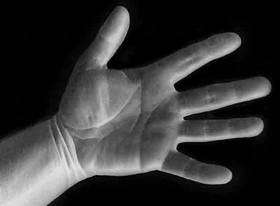Finger length predicts physically aggressive personalities, study shows

Dr. Peter Hurd initially thought the idea was "a pile of hooey," but he changed his mind when he saw the data.
Hurd and graduate student Allison Bailey have shown that a man's index finger length relative to ring finger length can predict how inclined that man is to be physically aggressive. Women do not show a similar effect.
A psychologist at the University of Alberta, Hurd said that it has been known for more than a century that the length of the index finger relative to the ring finger differs between men and women. More recently, researchers have found a direct correlation between finger lengths and the amount of testosterone that a fetus is exposed to in the womb. The shorter the index finger relative to the ring finger, the higher the amount of prenatal testosterone, and – as Hurd and Bailey have now shown – the more likely he will be physically aggressive throughout his life.
"More than anything, I think the findings reinforce and underline that a large part of our personalities and our traits are determined while we're still in the womb," said Hurd.
Hurd and Bailey's research, published this month in Biological Psychology, was determined from surveys and hand measurements of 300 U of A undergraduates.
In their study, they found there were no correlations between finger lengths and males who are prone to exhibit verbally aggressive, angry, or hostile behaviours, but there was to physically aggressive behaviour.
Hurd is conducting ongoing research in this area, including a study that involves measuring hockey players' finger lengths and cross-referencing the results with each player's penalty minutes. He also has a similar study showing that men with more feminine finger ratios are more prone to depression; a paper on this will be published later this year in the journal Personality and Individual Differences.
"Finger lengths explain about five per cent of the variation in these personality measures, so research like this won't allow you to draw conclusions about specific people. For example, you wouldn't want to screen people for certain jobs based on their finger lengths," Hurd said. "But finger length can tell you a little bit about where personality comes from, and that's what we are continuing to explore."
Source: University of Alberta
















